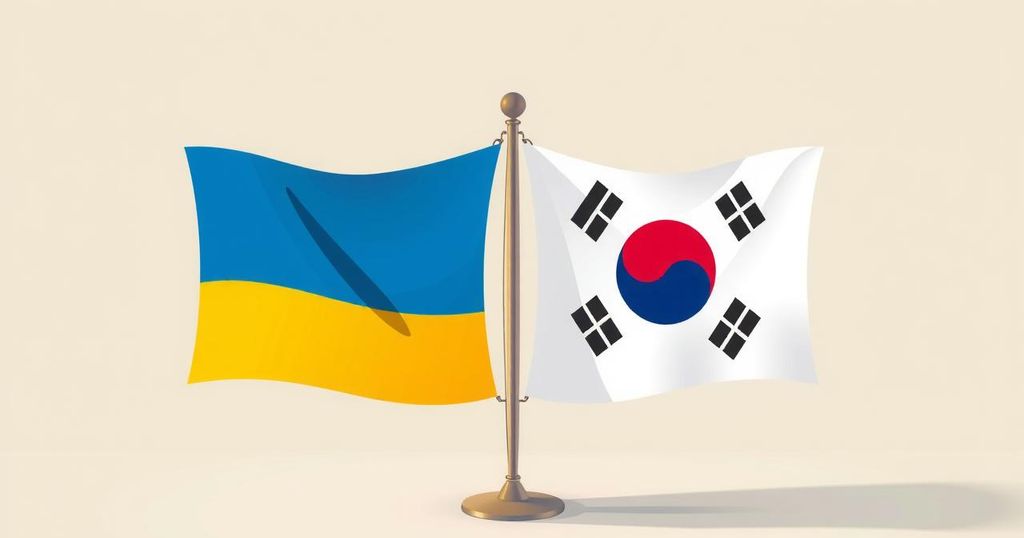World news
AND, ANDRII SYBIHA, ASIA, BIDEN ADMINISTRATION, CHO, CHO TAE - YUL, DEFENSE, DPRK, ENERGY INFRASTRUCTURE, EUROPE, EUROPE/ASIA, KOREA, NORTH, KOREA, SOUTH, MILITARY, NATIONAL INTELLIGENCE AGENCY OF, PYONGYANG, RUSSIA, SBU, SEOUL, UKRAINE, VOL, VOLODYMYR ZELENSKY, WAR, YO, YONHAP NEWS AGENCY
Marisol Gonzalez
0 Comments
Ukraine and South Korea Engage in Discussions Over North Korean POW Repatriation
On March 17, 2025, South Korea and Ukraine discussed the potential repatriation of two North Korean soldiers captured during the conflict against Russia. South Korean Foreign Minister Cho Tae-yul emphasized that the soldiers must express a desire to relocate according to the constitution. The situation is complicated by historical precedents, risks of diplomatic fallout, and the ongoing involvement of North Korean troops in military operations supporting Russia.
On March 17, 2025, diplomats from South Korea and Ukraine held discussions regarding the prospective repatriation of two North Korean soldiers who were captured amid the ongoing conflict between Ukraine and Russia. The discussions were led by South Korean Foreign Minister Cho Tae-yul and his Ukrainian counterpart, Andrii Sybiha, with the possibility of transferring the captured soldiers from the Democratic People’s Republic of Korea (DPRK) to South Korea at the forefront.
Minister Cho clarified the legal implications during the negotiations, stating, “Under South Korea’s Constitution, North Koreans are considered South Korean citizens, but the prisoners must express a desire to relocate.” This emphasizes the critical nature of the captured soldiers’ willingness as a determining factor for their potential resettlement to South Korea.
The involvement of North Korean soldiers was prompted by substantial troop deployments from Pyongyang to support Russia’s military, particularly as Russia faced significant manpower challenges. Reports estimate that approximately 12,000 North Korean troops were sent to Russia’s Kursk Oblast, correlating with an increase in cross-border incursions by Ukraine.
As of early January, Ukrainian intelligence indicated that over 4,000 North Korean soldiers had experienced casualties in combat, leading to heightened concerns. The two North Korean soldiers in question were captured on January 11, 2025, marking a significant event as they became the first North Korean military personnel to be apprehended alive, receiving medical assistance while under the custody of the Security Service of Ukraine (SBU).
Historically, South Korea has engaged with North Korean issues for many years, having welcomed about 34,000 defectors since the late 1990s. This prior experience informs the current negotiations, acknowledging potential diplomatic risks. Accepting the captured soldiers could enhance South Korea’s humanitarian image but may also strain ties with both North Korea and Russia.
For Minister Cho, the decision to accept the North Korean soldiers hinges on whether they express a desire to defect. Reports from the National Intelligence Agency of South Korea, as of January, indicate that the captured soldiers had not indicated such intentions, complicating the negotiations further. Additional troop deployments from North Korea to Russia are anticipated, given the ongoing losses experienced on the battlefield.
Active participation of North Korean troops has been noted, with Ukrainian officials reporting their tactics, particularly during assaults. Official Andriy Kovalenko remarked, “they are storming the frontlines in ‘columns,'” signifying their significant involvement and raising security concerns for neighboring regions.
Public statements from Ukraine highlight the dire circumstances faced by the North Korean military, with high casualty rates likely due to limited combat experience. Analysts suggest that these strategies contribute to heavy losses among the ranks of North Korean soldiers deployed in support of Russian operations.
On the social media platform X, Deputy Foreign Minister Sybiha conveyed appreciation for collaborating with South Korea and emphasized the necessity of addressing the dangerous cooperation between Russia and North Korea. This relationship poses a threat not only to European security but extends to the Korean Peninsula and the Indo-Pacific.
The response from the captured North Korean soldiers regarding their intent to relocate remains ambiguous. Their silence may reflect hesitance to become tools in global negotiations or may indicate strategic positioning by North Korea to gain leverage.
It is also essential to note divergent opinions concerning this issue. Yeonmi Park, a North Korean defector, criticized Ukraine, suggesting that linking the repatriation of prisoners to arms trading constitutes a violation of international law, emphasizing the delicate balance between humanitarian concerns and military strategy.
Ukrainian President Zelensky recognized the complexities involved in the capture of North Korean personnel, stating, “This was not an easy task,” given the risks faced by Ukrainian forces and the captured soldiers. This acknowledgment underscores the precarious nature of the situation.
The future of the captured soldiers and broader geopolitical implications will be influenced by the decisions made. The current silence from North Korea regarding the acceptance of its soldiers reflects ongoing complexities shaped by historical tensions, as stakeholders navigate alliances and humanitarian principles amid ongoing conflict. This dynamic remains fluid and continues to evolve as events unfold.
The negotiations between South Korea and Ukraine over the potential repatriation of North Korean soldiers highlights critical diplomatic and humanitarian considerations. As both nations assess the implications of such a move, the captured soldiers’ willingness to defect becomes a pivotal factor. The increased involvement of North Korean troops in support of Russian military efforts has exacerbated the complexity of the situation. Overall, the outcome of these discussions will significantly influence the geopolitical landscape amidst ongoing tensions.
Original Source: evrimagaci.org




Post Comment